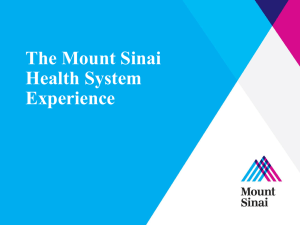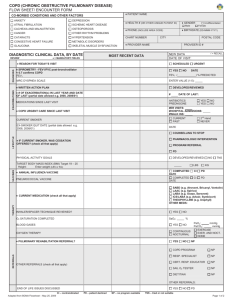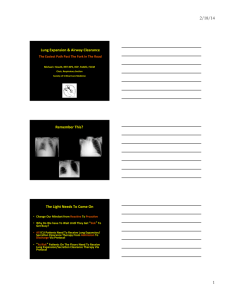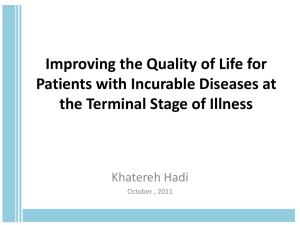Psychosocial risk factors for hospital readmission among community based
advertisement
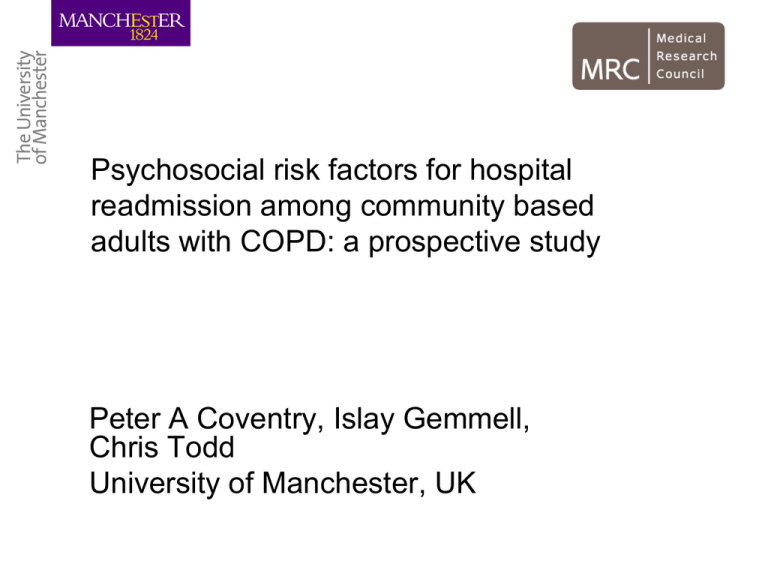
Psychosocial risk factors for hospital readmission among community based adults with COPD: a prospective study Peter A Coventry, Islay Gemmell, Chris Todd University of Manchester, UK Burden of chronic obstructive pulmonary disease (COPD) • The global prevalence of COPD in adults aged ≥40 years is 10% and increasing • In 2000, an estimated 10 million US adults reported physician-diagnosed COPD but under-diagnosed • Major burden on healthcare systems: • 8 million physician office and hospital outpatient visits • 1.5 million emergency department visits • 726,000 hospital admissions Cost of COPD • NHLBI survey estimated the total cost of COPD to the US in 2005 was $38.8 billion • $21.8 billion in direct costs • about 70% for hospital admissions and inpatient care • 10% of COPD patients responsible for over 70% of total expenditure • In UK NICE estimates that the direct cost of care in the NHS is £500 million a year • One in eight (130,000) emergency medical admissions in adults is due to COPD • largest cause of emergency admission in the UK • over 80% of the direct costs due to the high number of bed days Impact of hospital admission • In-patient mortality is about 10% and within 12-months it is about 40% • Rapid readmission for acute exacerbation within 3months occurs in about 30% patients • Readmission within 12-months in up to 55% patients • Impaired health related quality of life and increased psychosocial morbidity • A meta-analysis of 13 studies (n=900) found that the prevalence of depression was 40% (95% CI: 36 to 44%), and 36% for anxiety (95% CI: 31 to 46%) Risk factors for readmission • Physiological factors, medication history and health status associated with risk of readmission • Despite high prevalence we know relatively little about impact of anxiety and depression on hospital (re)admissions • Psychosocial factors are associated with – impaired health status (lower QOL) – poorer treatment outcomes and reduced survival following emergency treatment – longer hospitalisation – poorer prognosis within 12-months after hospital discharge Aims of the study • Are psychosocial factors associated with risk of readmission in community based COPD patients? • We hypothesised that psychosocial factors will be significantly associated with readmission regardless of disease severity and other covariates (age, gender etc) • Measure change in psychosocial status over 12 months after index admission Methods (1): design and sampling • Prospective cohort study with follow-up at 90 and 365 days • Validated diagnosis of COPD (ICD−10 codes J40−J44, J47) – clinical history – FEV1/FVC ratio 70% and FEV1 <80% predicted • Exclusion criteria: – cancer or other terminal illness – other obstructive airways disease (bronchiectasis, asthma) or lung reduction surgery – severe and enduring mental health problems Methods (2): data collection • Primary outcome is readmission/death following index admission during observational period • Recruited patients admitted for exacerbation at home 1 week after discharge from 3 acute NHS hospitals in UK • Routine data collected at baseline: – sociodemographics – lung function (FEV1 % predicted) – previous hospital admission for COPD – medication history – medical comorbidities • Self-report tools used to measure psychosocial status Methods (3): measuring QOL and psychological morbidity • HRQOL measured with St George’s Respiratory Questionnaire (SGRQ) – total score (0-100; higher scores indicate poorer QOL; difference of 4% is clinically significant) • Hospital Anxiety and Depression Scale (HADS) – validated and reliable psychological screening instrument used in medically ill populations – 14-item self-report questionnaire with two 7-item subscales for anxiety and depression – scores range from 0 to 21 – scores of ≥8 on either sub-scale used as cut-off for caseness Methods (4): measuring social support • Emotional support central to ‘buffering’ model of social support – support is beneficial in times of crisis or stress – support reduces impact of stressor by assisting coping strategies • Enhancing Recovery in Coronary Heart Disease (ENRICHD) trial developed tool to measure social support (ENRICHD Social Support Instrument [ESSI]) • ESSI is a 7 item scale measuring deficiencies in perceived instrumental, structural and emotional support – score of 3 or less on 2 or more items, excluding items about help with chores and marital status, and/or a total score of ≤18 on remaining items defines low social support. • First time it has been used in a COPD population Analysis • Univariable logistic regression analysis was used to assess which psychosocial variables were associated with readmission at 90 days • Multivariable logistic regression adjusted for age and gender and % predicted FEV1 were used to estimate which psychosocial variables were independently associated with readmission at 90 days Results (1): descriptive statistics Sample characteristics at baseline Mean age (SD) Sex, male n (%) FEV1% predicted, mean (SD) SGRQ total, mean (SD) n=79 65.3 (9.9) 44 (56) 42.2% (18.4) 58.8 (14.6) HADS anxiety, mean (SD) 8.7 (4.2) HADS depression, mean (SD) 7.0 (3.7) HADS total, mean (SD) 15.7 (6.9) ESSI total, mean (SD) 26.5 (6.3) Results (2) • High levels of psychological distress – 46 (58.2%) HADS – anxiety ≥8 – 34 (43%) HADS – depression ≥8 • But high levels of emotional support – 25% patients had low social support • 26 (32.9%) patients were readmitted within 90 days • Univariable logistic regression : – FEV1% predicted significant predictor of readmission (OR=0.97; 95% CI:0.94, 1.00, p=0.033) • Multivariable logistic regression: – QOL, adjusted for age, gender and FEV1% predicted was significant predictor (OR=1.04; 95% CI:1.00, 1.09, p=0.049) Conclusions and limitations • Lung function, HRQOL, age and gender appear to be key drivers of rapid hospital readmission • Anxiety and depression not risk factors for readmission • Social support does not seem to have an impact on risk of readmission – does it act as a buffer? • Small sample size and insufficient power to detect a significant difference in psychosocial status between patients who are readmitted and not readmitted • Future analysis to examine if change in scores for psychosocial variables is associated with readmission after 90 days Implications for policy and practice • Further work to investigate if psychosocial factors are linked to coping and potentially modifiable: – improved self-management – reduced demand on health services • Community based pulmonary rehabilitation programmes that include psychosocial support improve – – – – exercise capacity HRQOL, anxiety and depression and possibly reduce admissions
